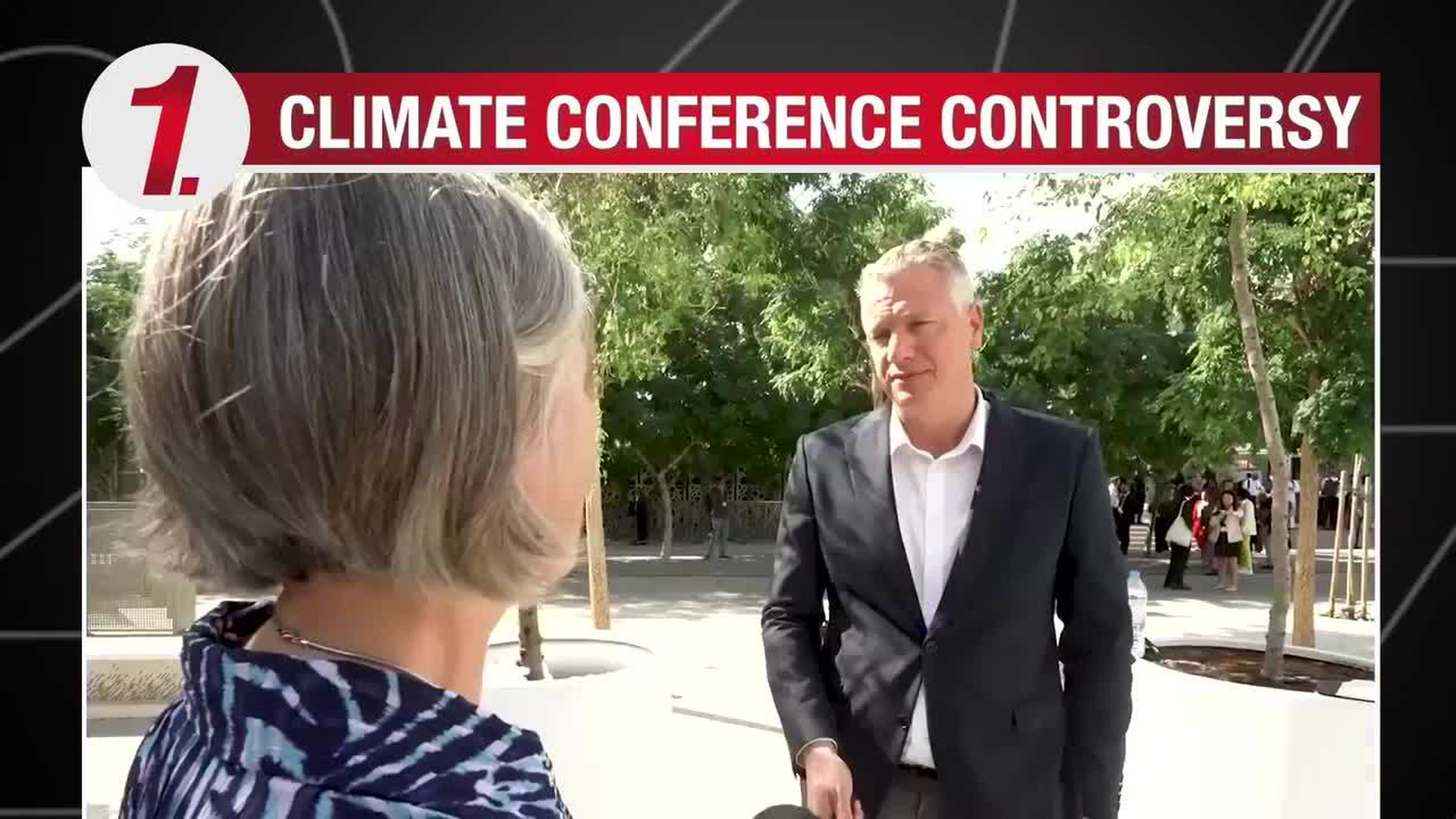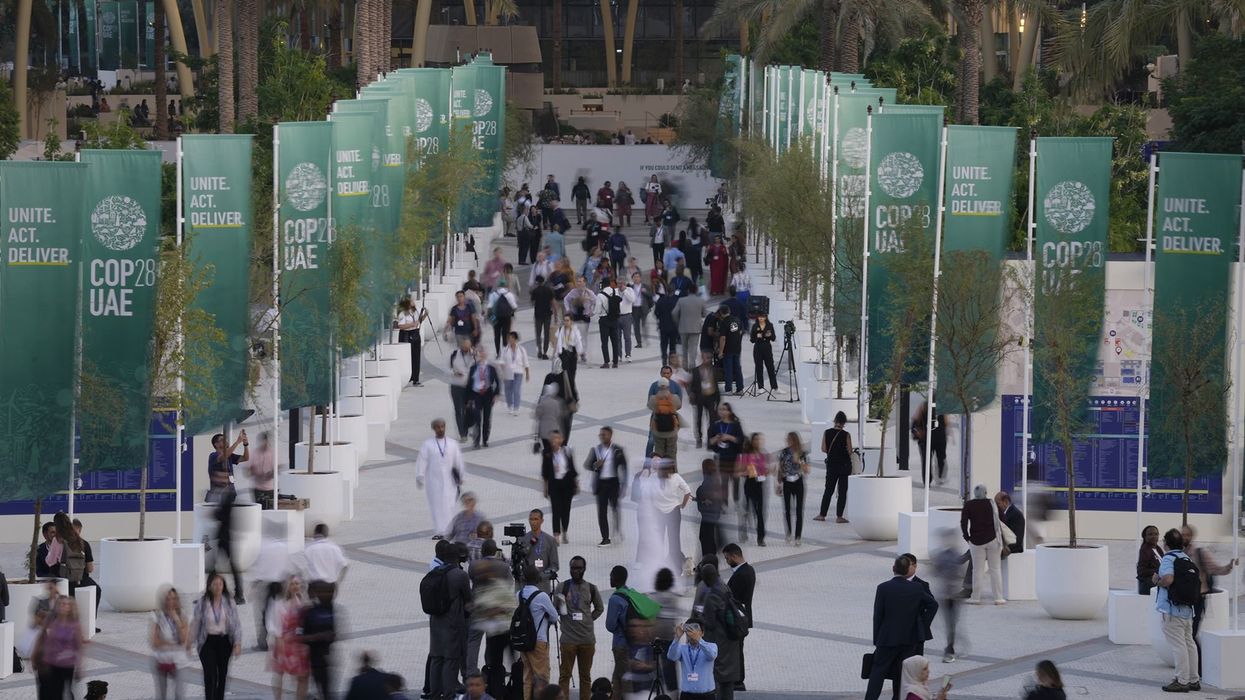
Video Source: Advocate Channel
Dubai (CNN) — Climate advocates are warning the COP28 climate summit could be on the cusp of failure after a new draft of the core agreement removed a call to phase out fossil fuels, the main driver of the climate crisis.
The draft, posted Monday more than six hours later than expected, instead used watered-down language on fossil fuels in an apparent concession to oil-producing nations that opposed the measure.
It calls on countries to take actions to reduce planet-warming pollution, which “could” include reducing the consumption and production of oil, coal and gas. Many climate experts and observers have blasted the draft for its vague language – including the use of the nonspecific “could” – and a lack of concrete timelines.
More than 100 countries came to the Dubai talks supporting language to phase out fossil fuels, and many are likely to voice their opposition in coming sessions. Others, such as Saudi Arabia, which have pushed against the inclusion of any reference to fossil fuels, may attempt to water the text down further still.
If the current draft does not get widespread support, negotiators may need to return to debate.
Earlier drafts had included several options that called on countries to phase out climate-polluting oil, gas and coal, which observers said was an encouraging sign that this year’s summit agreement would be stronger than previous years.
Climate advocate and former US Vice President Al Gore said in a post on X the summit “is now on the verge of complete failure.”
“The world desperately needs to phase out fossil fuels as quickly as possible, but this obsequious draft reads as if OPEC dictated it word for word,” Gore said. “It is even worse than many had feared.”
The secretary-general of the oil-producing group OPEC, Haitham Al Ghais, called on members and allies last week to “proactively reject” any language that targeted fossil fuels rather than emissions.
The letter, written before the latest draft was posted, noted the previous option for a “fossil fuels phase out” and said it would be “unacceptable that politically motivated campaigns put our people’s prosperity and future at risk.”
The new draft calls for countries to take action to reduce planet-warming emissions, with a menu of choices that could include “reducing both consumption and production of fossil fuels, in a just, orderly and equitable manner so as to achieve net zero by, before, or around 2050 in keeping with the science.” It also includes an option for “tripling renewable energy capacity globally.”
“We have made progress. But we still have a lot to do,” COP28 President Sultan Al Jaber said Monday in a summit session. “You know what remains to be agreed. And you know that I want you to deliver the highest ambition on all items, including on fossil fuel language.”
Al Jaber, who is also the head of the UAE’s state-owned oil company, has had a controversial summit.
Shockwaves ripped through the talks shortly after they began last weekend when comments from Al Jaber made in November came to light. In a panel discussion, he said there is “no science” behind the demand that phasing out fossil fuels is necessary to keep global warming below 1.5 degrees Celsius — the goal of the Paris climate agreement.
In response, Al Jaber fiercely defended his commitment to climate science the next day, and said phasing out fossil fuels is “inevitable” and “essential.”
‘Our death certificate’
Monday’s draft came after marathon negotiations and was published more than six hours later than expected. The conference is due to end on Tuesday, but the new draft — which is far from what many nations in Dubai had called for — could prolong one of the most contentious and high-stakes conferences in its nearly three decade history.
The Alliance of Small Island States (AOSIS), an intergovernmental organization, has already indicated its members will not approve the agreement in its current form and has criticized the negotiations as lacking transparency and inclusivity.
“We will not sign our death certificate,” Cedric Schuster, a Samoan politician and chair of AOSIS, said in a statement. “We cannot sign on to text that does not have strong commitments on phasing out fossil fuels.”
A US State Department spokesperson said in a statement the draft “seeks to balance a variety of interests,” but still “needs to be substantially strengthened.”
Lead negotiators for the European Union described the draft as “insufficient.”
“I cannot hide the fact from you that the text, as it now stands, is disappointing,” EU Climate Action Commissioner Wopke Hoekstra told reporters. “There are a couple of good things in there, but overall, it is clearly insufficient and not adequate to addressing the problem we are here to address.”
Hoekstra added that the EU was sticking to its stance, calling for the for the phase-out of coal, oil and gas, allowing only for fossil fuel use in sectors where renewables are difficult to employ. Heavy industries like steelmaking, for example, can’t use wind and solar power.
Alok Sharma, a British MP and the president of COP26 in Glasgow two years ago, said it’s “difficult to see how this text will help to achieve the deep and rapid cut in emissions we need by 2030.”
“With so many countries backing clear language on fossil-fuel-phase-out, who does this text actually serve?” Sharma said on X, formerly Twitter.
Harjeet Singh, head of global political strategy at Climate Action Network International, said the latest draft was “a significant regression” from previous versions.
“Astonishingly, it has dropped explicit language on phasing out fossil fuels, opting instead for a vague commitment to ‘reduce both consumption and production’ by 2050,” he told CNN. “This is a clear indication of the fossil fuel industry’s lobbying power, influencing global policies to favor prolonged fossil fuel use.”
Rachel Cleetus, the policy director and a lead economist for the Climate and Energy Program at the Union of Concerned Scientists, said the draft agreement was “extremely disappointing, concerning, and nowhere close to the level of ambition people around the world deserve.”
“This draft comes with a huge qualifier of ‘could’ at the top that makes all the listed actions optional for nations. It has a laundry list of actions filled with glaring loopholes, including a lack of meaningful timelines” she said in a statement.
This story has been updated with additional information.
CNN’s Ella Nilsen and Rachel Ramirez contributed to this report.
The-CNN-Wire
™ & © 2023 Cable News Network, Inc., a Warner Bros. Discovery Company. All rights reserved.


















































